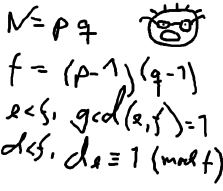poj2635——同余模定理,打印素数表
poj2635——同余模定理,打印素数表
The Embarrassed Cryptographer
| Time Limit: 2000MS | Memory Limit: 65536K | |
| Total Submissions: 12603 | Accepted: 3367 |
Description
 The young and very promising cryptographer Odd Even has implemented the security module of a large system with thousands of users, which is now in use in his company. The cryptographic keys are created from the product of two primes, and are believed to be secure because there is no known method for factoring such a product effectively.
The young and very promising cryptographer Odd Even has implemented the security module of a large system with thousands of users, which is now in use in his company. The cryptographic keys are created from the product of two primes, and are believed to be secure because there is no known method for factoring such a product effectively. What Odd Even did not think of, was that both factors in a key should be large, not just their product. It is now possible that some of the users of the system have weak keys. In a desperate attempt not to be fired, Odd Even secretly goes through all the users keys, to check if they are strong enough. He uses his very poweful Atari, and is especially careful when checking his boss' key.
Input
The input consists of no more than 20 test cases. Each test case is a line with the integers 4 <= K <= 10100 and 2 <= L <= 106. K is the key itself, a product of two primes. L is the wanted minimum size of the factors in the key. The input set is terminated by a case where K = 0 and L = 0.
Output
For each number K, if one of its factors are strictly less than the required L, your program should output "BAD p", where p is the smallest factor in K. Otherwise, it should output "GOOD". Cases should be separated by a line-break.
Sample Input
143 10 143 20 667 20 667 30 2573 30 2573 40 0 0
Sample Output
GOOD BAD 11 GOOD BAD 23 GOOD BAD 31
题意:一个整数K(大数)是两个素数A和B(A<=B)的乘积,满A<L则输出“GOOD”,否则输出“BAD”和A
思路:将K用字符串读取再转为千分制的数组K,利用同余模定理求余数判断能否被给定范围(2,L)中的某一素数整除
虽然思路参考了题解,但程序还是完全由自己写并一步一步调试成功的,庆祝一下!

#include<iostream> #include<cstdio> #include<cstring> #include<cstdlib> #include<algorithm> using namespace std; const int maxn=1000100; const int INF=(1<<28); char Kc[maxn]; int K[maxn],len; int L; bool isprime[maxn]; int prime[maxn],cnt=0; void play_prime() { memset(isprime,1,sizeof(isprime)); //for(int i=1;i<=30;i++) cout<<isprime[i]<<endl; isprime[1]=0; for(int i=2;i<maxn;i++){ if(!isprime[i]) continue; for(int j=i*2;j<=maxn-i;j+=i){ isprime[j]=0; } } cnt=0; for(int i=1;i<maxn;i++){ if(isprime[i]) prime[cnt++]=i; } } int mod(int *K,int t) { int res=0; for(int i=len-1;i>=0;i--){ res=(res*1000+K[i])%t; } return res; } void debug_prime() { for(int i=0;i<100;i++){ cout<<prime[i]<<" "; if(i%10==0) cout<<endl; } } void debug_K() { for(int i=len-1;i>=0;i--) cout<<K[i]<<" "; cout<<endl; } int main() { play_prime(); //debug_prime(); while(scanf("%s%d",Kc,&L)!=EOF){ if(strcmp(Kc,"0")==0) break; len=0; for(int i=strlen(Kc)-1;i>=0;i-=3){ K[len++]=(Kc[i]-'0')+(i-1>=0?(Kc[i-1]-'0'):0)*10+(i-2>=0?(Kc[i-2]-'0'):0)*100; } //debug_K(); bool flag=1; int ans; for(int i=0;i<cnt;i++){ if(prime[i]>=L) break; if(mod(K,prime[i])==0){ flag=0; ans=prime[i]; break; } } if(flag) cout<<"GOOD"<<endl; else cout<<"BAD "<<ans<<endl; } return 0; }
没有AC不了的题,只有不努力的ACMER!




 浙公网安备 33010602011771号
浙公网安备 33010602011771号